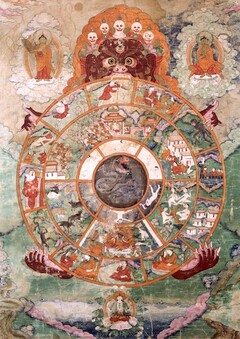Commentary on Dependent Origination
Commentary on Nāgārjuna's Verses on the Essence of Dependent Origination
by Jamyang Loter Wangpo
In the language of India: pratītyasamutpāda hṛdaya kārikā
In the language of Tibet: rten cing 'brel par 'byung ba'i snying po tshig le'ur byas pa
Homage to Mañjuśrī, the Youthful!
This explanation of dependent origination has two parts: 1) its nature and 2) its subdivisions.
1. The Nature of Dependent Origination
This is further divided into three. 1) The basis to be defined is all conditioned phenomena. 2) The definition is something that arises in dependence or originates through causes and conditions. 3) The literal meaning is based on the original Sanskrit term pratītyasamutpāda. Here, the preposition prati- indicates contact (phrad pa) or dependence (rten pa). Iti is from the root for 'to go', but here when combined with prati has the sense of connection and coincidence. The root pāda can be a term on its own, but here since it is preceded by the prefix samut- has the sense of origination. Thus, the term as a whole means origination that precisely connects causes and conditions with their effects.
2. Subdivisions
There is the outer dependent origination of creation and destruction and so on, and there is also inner dependent origination of ignorance and the rest, which can be related to the process of thorough affliction (kun nyon) or the process of complete purification (rnam byang). Here, the explanation concerns inner dependent origination. How is it explained? The text says that the Buddha taught twelve different links or stages as dependent origination:
- ignorance,
- formations,
- consciousness,
- name and form,
- the six sensory sources,
- contact,
- sensation,
- craving,
- clinging,
- becoming,
- birth, and
- old age and death.
These can be summarized in three categories: 1) mental afflictions, 2) karma and 3) suffering. The first [of the twelve], ignorance, the eighth, craving, and the ninth, clinging, are afflictions. The second, formations, and the tenth, becoming, are karma. The remaining seven — consciousness, name and form, sensory sources, contact, sensation, birth, and old age and death — are suffering. Thus the twelve links are grouped in three.
From the three of affliction, karma and suffering, the two of affliction and karma originate. Clinging originates from the affliction of craving, and formations and becoming originate from the afflictions of ignorance and craving. And from the two karmic links come the seven bases: consciousness, name and form, the sensory sources, contact and sensation originate from formations; and birth and old age and death originate from becoming.
From the seven bases, the three [of ignorance, craving and clinging] come once again — craving originates from sensation and clinging from craving. Craving is of the same essence as ignorance. Everything up to and including sensation is subject to aging and death, so ignorance arises from old age and death. From this the formations and the rest arise.
Alternatively, formations originate from craving and the ignorance that is identical to it in essence; and becoming originates from clinging. The links from consciousness to clinging originate from formations; birth and old age and death arise from becoming; and ignorance and the rest originate from old age and death.
Thus the wheel of existence turns and turns. All beings consist of causes and effects, in which there is no ‘sentient being’ at all. From phenomena which are exclusively empty, there arise only empty phenomena. All things are devoid of any ‘I’ or ‘mine’. Like a recitation, a candle, a mirror, a seal, a magnifying glass, a seed, sourness, or a sound, so also with the continuation of the aggregates — the wise should know that they are not transferred. Then, as for extremely subtle entities, those who regard them with nihilism, lacking precise and thorough knowledge, will not see the actuality of conditioned arising. In this, there is not a thing to be removed, nor the slightest thing to be added. It is looking perfectly into reality itself, and when reality is seen, complete liberation.
This concludes the verses on ‘The Heart of Dependent Origination’ composed by the teacher Ārya Nāgārjuna.
| Translated by Adam Pearcey, 2019.
Bibliography
Tibetan Edition
blo gter dbang po. "rten cing 'brel bar 'byung ba'i snying po." In blo gter dbang po'i gsung 'bum. Chengdu: Blo gros phun tshogs sogs, 1998. Vol 2: 559–562
Version: 1.2-20211213
